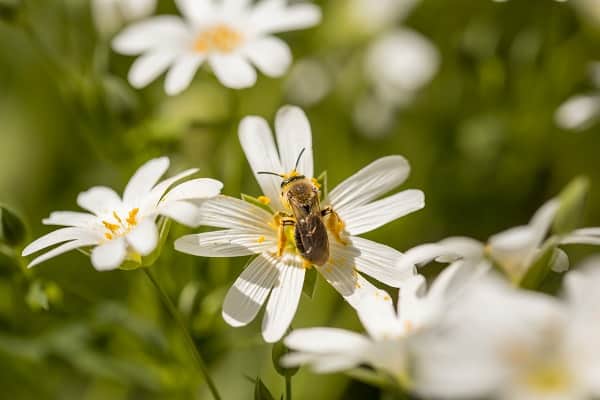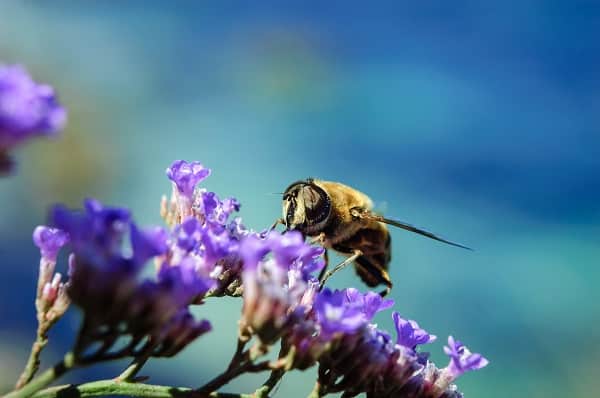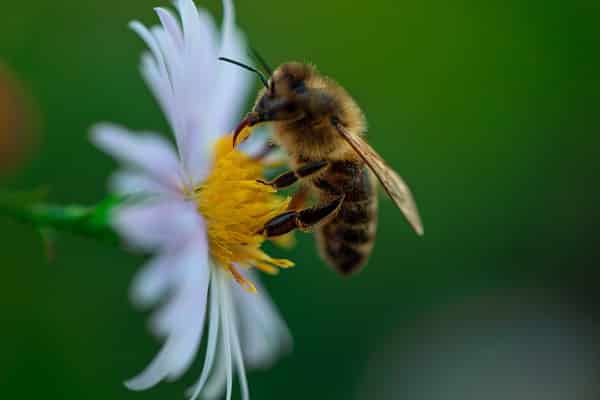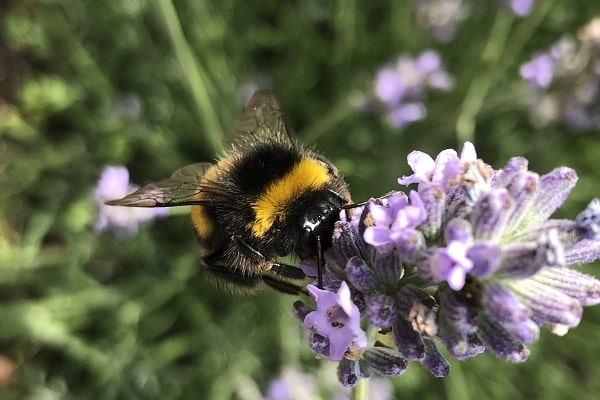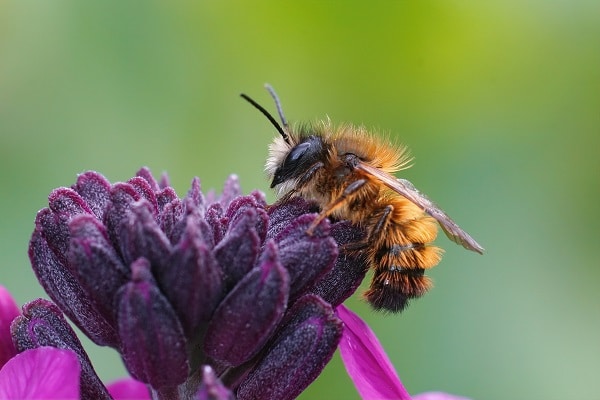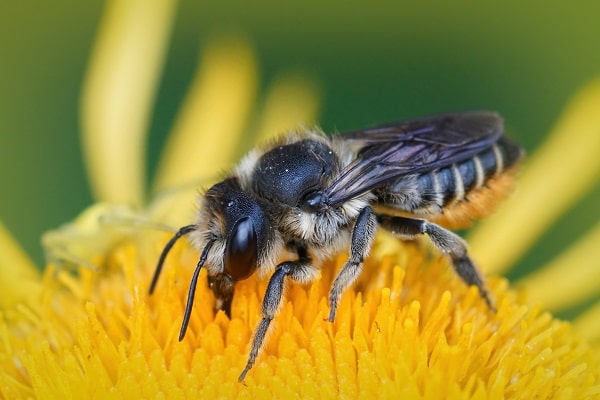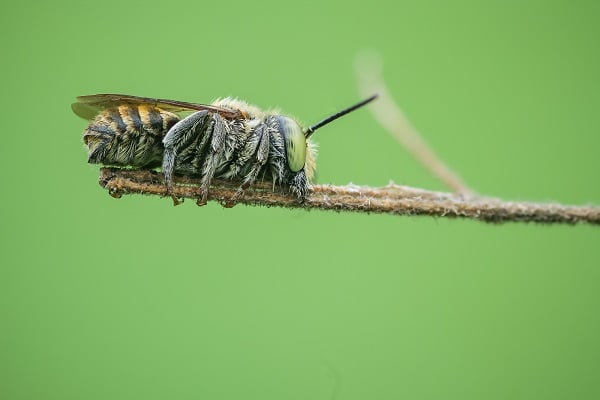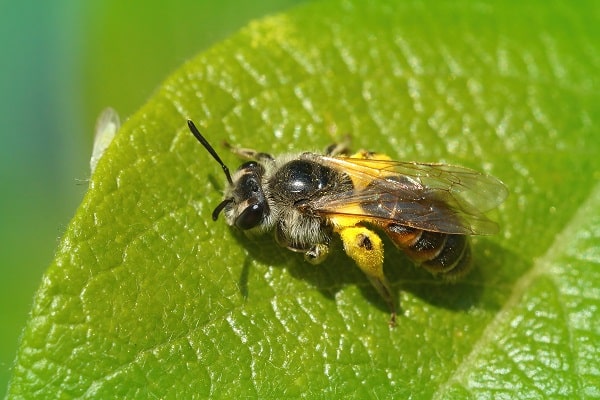Your garden is a verdant mosaic of life, buzzing with tireless pollinators, the most crucial of which are bees. These seemingly modest creatures are, in fact, indispensable to the very survival and biodiversity of the planet. In this article, you will get a look into the vibrant world of these extraordinary pollinators, examining seven specific species of beneficial bees that you’ll want to frequent in your garden. By the end, you’ll have a better understanding of the role these incredible insects play and why bees are such essential members of any garden.
Contents
- 1 The Importance Of Bees In Your Garden
- 2 Understanding The Fear Of Bees
- 3 Honeybees (Apis Mellifera)
- 4 Bumblebees (Bombus Species)
- 5 Mason Bees (Osmia Species)
- 6 Leafcutter Bees (Megachile Species)
- 7 Sweat Bees (Halictidae Family)
- 8 Carpenter Bees (Xylocopa Species)
- 9 Miner Bees (Andrenidae Family)
- 10 Inviting Bees Into Your Garden
- 11 Embrace These Beneficial Bees In Your Garden!
- 12 Resources
The Importance Of Bees In Your Garden
It’s easy to overlook the vital role bees play in the well-being of your garden and the broader ecosystem. Bees are primary pollinators, transferring pollen from the male parts of a flower to the female parts. This transfer allows fertilization to occur and seeds to grow. The presence of bees in a garden can have dramatic effects on flower and fruit production, as well as the overall health of the ecosystem.
Beyond pollination, bees play an integral role in promoting biodiversity in your garden. They do so by aiding in the propagation of diverse plant species, thus creating a balanced and thriving ecosystem. Creating an environment conducive to bees is not just an added advantage; it’s a crucial step for any gardener who wants to have a vibrant, thriving garden.
Understanding The Fear Of Bees
Fear of bees, also known as melissophobia, is common and understandable. Many people associate bees with painful stings, but it’s important to remember that most bee species are non-aggressive and pose little threat to humans unless threatened or provoked. Bees are far more interested in the nectar and pollen they collect from flowers than in human interaction.
However, it’s essential to remember that the bee universe is incredibly diverse. There are thousands of different species of bees, each with unique behaviors, temperaments, and characteristics. In the sections below, you’ll explore various beneficial bee species that are not only advantageous to your garden but are also generally gentle and unobtrusive.
Honeybees (Apis Mellifera)
The honeybee, or Apis mellifera, is what most people picture when they think of bees. These social insects are amazing pollinators and play a pivotal role in the global food chain. Beyond their crucial role in pollination, honey bees are revered for their ability to produce honey, a natural sweetener loved by many.
Honeybees also contribute significantly to the reproductive success of a vast range of plants. This has a direct impact on the abundance and health of many other organisms in the ecosystem, including other insects, birds, and mammals. Their industrious nature ensures that flowers reproduce, contributing to the lush growth of your garden. A garden bustling with honey bees is a garden that’s sure to flourish.
Bumblebees (Bombus Species)
Bumblebees are hardy, robust insects that add immense value to any garden. They can fly in cooler temperatures and lower light levels than many other bees, making them critical pollinators early in the spring and late into the fall. Bumblebees also have a unique form of pollination called “buzz pollination”. They vibrate their bodies at a particular frequency to shake the pollen out of flowers.
This makes them excellent pollinators of certain fruits and vegetables, such as tomatoes and peppers. The presence of bumblebees in a garden not only ensures high productivity but also adds a lively buzz that speaks of a vibrant, healthy ecosystem.
Mason Bees (Osmia Species)
Mason bees, known for their solitary nature and characteristic mud-capped nests, are among the first bees to emerge when spring arrives. They have an extraordinary pollination efficiency, which often surpasses that of honeybees. Despite their solitary nature, mason bees are incredibly gentle and seldom sting.
Moreover, they are less likely to cause an allergic reaction compared to honeybees, making them safer around children and pets. Given their high pollination efficiency, non-aggressive nature, and resilience to adverse weather conditions, mason bees can serve as a valuable asset in any garden, helping plants to flourish and contributing to a healthy and diverse ecosystem.
Leafcutter Bees (Megachile Species)
Leafcutter bees, known for their distinctive habit of cutting neat circular sections from leaves, are solitary bees that are often mistaken for wasps due to their slender, dark-colored bodies. However, they are one of the most efficient pollinators out there and are beneficial for any garden. In your garden, leafcutter bees can be highly advantageous, especially if you have a wide range of plant species.
They can increase the biodiversity of your garden by ensuring the cross-pollination of different plant species. Though they might occasionally cut small sections from your plants’ leaves to construct their nests, they pose no significant damage to your garden, and the overall benefits they offer far outweigh any minor cosmetic damage to the leaves.
Sweat Bees (Halictidae Family)
Sweat bees, although often overlooked due to their small size, are beneficial pollinators for a wide variety of plants. Their attraction to sweat can sometimes surprise gardeners, but they are not aggressive and are excellent pollinators, especially for fruits and vegetables.
Sweat bees are particularly attracted to native flowering plants. By planting a variety of such flowers in your garden, you can attract these useful pollinators and boost the productivity and health of your garden. Despite their minute size, sweat bees make a considerable contribution to a garden’s ecology.
Carpenter Bees (Xylocopa Species)
Carpenter bees are solitary bees known for their habit of burrowing into wood to lay their eggs. While this behavior may seem destructive, it’s essential to note that these bees are effective pollinators for many types of open-faced flowers. Carpenter bees can be beneficial to your garden by aiding in the pollination of various flowering plants, promoting a healthier and more diverse garden ecosystem.
Despite their sometimes daunting size, carpenter bees are generally non-aggressive and pose little threat to humans. Welcoming them into your garden can help improve the productivity of your flowering plants and contribute to a more balanced ecosystem.
Miner Bees (Andrenidae Family)
Miner bees, also known as digger bees, are solitary bees that nest in the ground. They are an early sign of spring, emerging to forage and pollinate when temperatures start to rise. This makes them especially important for the pollination of spring-blooming plants. These bees are great for early gardens, pollinating plants when few other pollinators are active.
The presence of miner bees can give your garden a head start at the onset of the warm season, allowing you to enjoy a vibrant and colorful garden early on. Their unique early-bird behavior makes them invaluable to gardeners and contributes significantly to the ecosystem’s overall health.
Inviting Bees Into Your Garden
Attracting bees to your garden doesn’t require a significant overhaul of your space. A variety of flowering plants that bloom at different times throughout the year can provide bees with a constant food source. Furthermore, avoiding pesticides and setting up bee houses or nesting sites can draw these essential pollinators to your garden.
A garden buzzing with bees is a sight to behold and a sign of a vibrant, healthy ecosystem. By taking steps to make your garden more bee-friendly, you’ll see a noticeable increase in your garden’s productivity, and the gentle hum of bees will become a soothing soundtrack symbolizing the vitality and balance of your garden.
Embrace These Beneficial Bees In Your Garden!
As you finish this exploration of the bee world, it’s clear that these beneficial bees play a far more critical role than merely being garden visitors. From the honey-producing honey bees to the early-rising miner bees, each species contributes uniquely to our gardens and the broader ecosystem. So, the next time you see a bee buzzing around your garden, remember its vital role and importance. Embrace these tiny, industrious gardeners and provide them with safe and welcoming habitats. Their presence in your garden signifies a healthy, thriving ecosystem and a hopeful future for the planet.
Resources
- “The Buzz about Bees: Biology of a Superorganism” by Jürgen Tautz, Springer-Verlag Berlin Heidelberg, 2008. Access here
- “The Bees in Your Backyard: A Guide to North America’s Bees” by Joseph S. Wilson and Olivia Messinger Carril, Princeton University Press, 2015. Access here
- “Bumble Bees of North America: An Identification Guide” by Paul H. Williams, Robbin W. Thorp, Leif L. Richardson, and Sheila R. Colla, Princeton University Press, 2014. Access here
